What Is a Good 10k Time? 7 Tips to Improve Your Speed
Author:
Unlock your full potential by engaging with our experts and community! Have questions about your fitness journey or looking for expert advice on weightlifting techniques? Don’t hesitate — leave a comment below and Oleksandr Zagrebelnyi will provide a personalized answer and insights to help you reach your goals.
Torokhtiy is reader-supported. Some links are affiliate links, and we may earn a commission at no extra cost to you. See our disclosure page for details.
Are you new to 10k running and unsure how to train? Wondering what is a good 10k time? Running a 10k can be challenging, so it’s important to know your goals and train accordingly.
In this blog post, we’ll provide insight into the average 10k time. You’ll learn how to train properly for the best results, gain strategies for running faster on race day performance, and discover some tips for improving your time.
Read on if you’re looking for practical advice on achieving a personal best in your next 10k!
What’s a good time for a 10k? – A good 10k time is about 45 minutes for men and 50 minutes for women. The average time for a 10k run varies depending on age, gender, and level of fitness, as well as the terrain type and weather conditions.
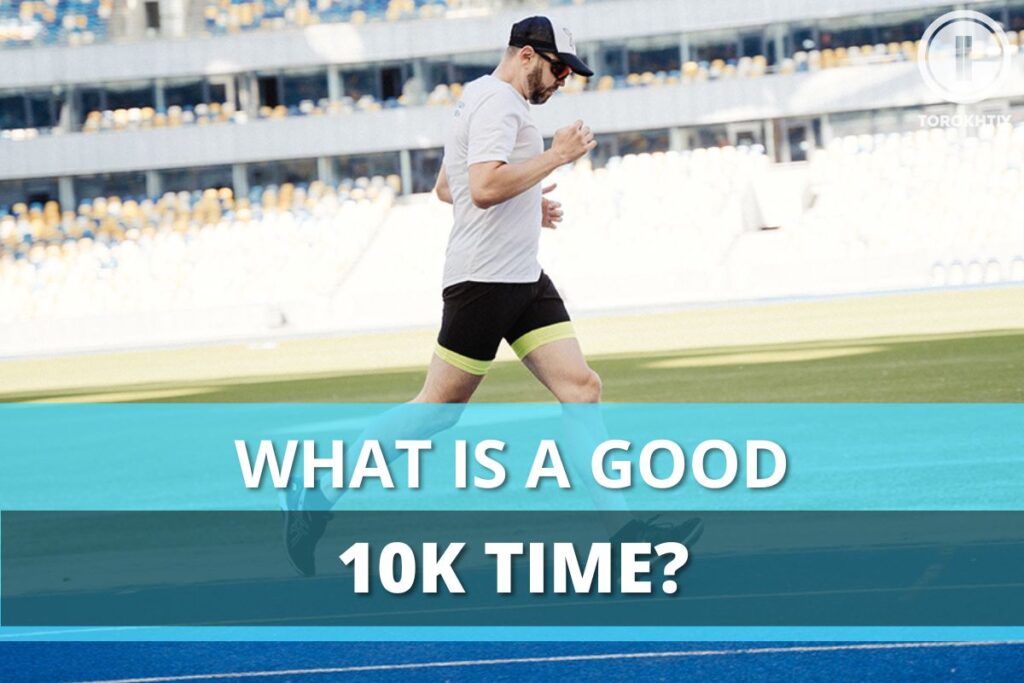
Average 10K Time
One of the most popular recreational running races is a 10K, or 6.2-mile run. It’s a great way to test your cardiovascular endurance and see how much progress you have made in terms of running speed and fitness level.
But how long is a 10k in other metrics? A 10K race is about 8500 steps, depending on a runner’s stride length, with each kilometer having approximately 684-781 steps for men and 818-924 steps for women.
A typical 10K route involves winding footpaths or roads, and usually includes at least small changes in terrain from start to finish. Depending on your level of experience and speed work, it may take anywhere from 30 minutes for an elite runner and all the way up to 1 hour 30 minutes for those who are completely new to running.
Let’s discuss these averages in more detail.
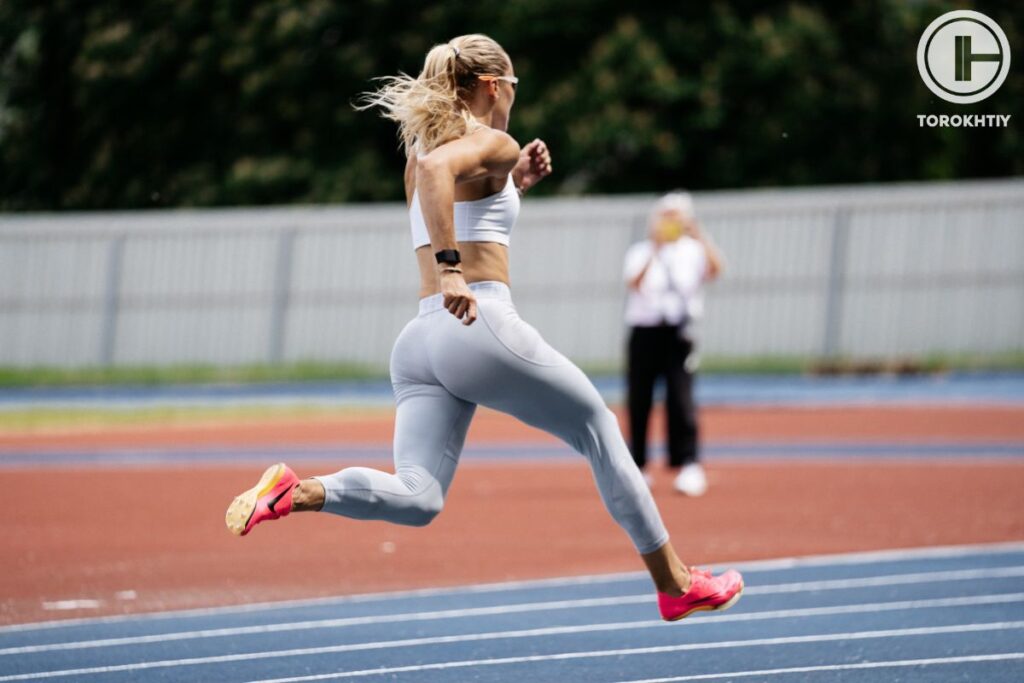
Average 10K Times by Age and Gender
Wondering what is a good 10k time by age? Average 10K times can vary drastically, depending on age and gender. Generally, men tend to have better results than women in 10K races. As runners get into their late 30s and 40s, they typically slow down, but can still do well as long as they train regularly. Here’s the average 10k time by age chart:
| Age | Male | Female |
|---|---|---|
| 20-30 | 00:42-00:48 | 00:52-00:58 |
| 30-40 | 00:48-00:54 | 00:54-01:00 |
| 40-50 | 00:52-00:58 | 00:58-01:02 |
| 50-60 | 00:56-01:04 | 01:04-01:10 |
| 60-70 | 01:00-01:10 | 01:12-01:18 |
| 70+ | 01:00-01:10 | 01:26-01:42 |
While average 10K times are based on many factors, such as terrain type and weather conditions, age and gender definitely play an important role when predicting your running performance.
Average Time for 10K Based on Level of Training
Depending on a runners’ fitness level, 10K times can range drastically. From beginners to professional athletes, times largely depend on the amount of training that has been put in.
Average 10k Time for Beginners
For beginners starting out in the world of running, a 10K is a terrific goal. Though many new runners are eager to tackle the distance and reach the finish line in their best time, it’s important to understand that everyone has different abilities. Here are averages for beginning runners.
| Age | Male Beginners | Female Beginners |
|---|---|---|
| 20-30 | 00:54-01:05 | 01:02-01:13 |
| 30-40 | 00:54-01:07 | 01:03-01:16 |
| 40-50 | 00:56-01:13 | 01:05-01:23 |
| 50-60 | 01:01-01:20 | 01:11-01:34 |
| 60-70 | 01:07-01:28 | 01:20-01:48 |
| 70+ | 01:14-01:43 | 01:32-01:56 |
The average 10k time for beginners is 01:05 for men and 01:13 for women, while a good time for a 10k beginner is about 00:55-01:02. This number can vary, depending on the runner’s particular fitness level and amount of training they have done leading up to race day. Age is also an influencing factor, as those who are younger tend to perform better than older individuals.
Average 10k Time for Intermediate Runners
Intermediate runners typically can finish a 10K race in under 50 minutes. This requires them to maintain an average pace of 7-9 minutes per mile and be comfortable with running relatively long distances.
| Age | Male Intermediate | Female Intermediate |
|---|---|---|
| 20-30 | 00:40-00:46 | 00:48-00:54 |
| 30-40 | 00:41-00:48 | 00:47-00:56 |
| 40-50 | 00:42-00:52 | 00:49-01:01 |
| 50-60 | 00:46-00:57 | 00:54-01:09 |
| 60-70 | 00:50-01:03 | 01:01-01:19 |
| 70+ | 00:55-01:14 | 01:15-01:34 |
Intermediate 10K times depend on elements such as training, fitness level, and age. A well-prepared runner should be able to complete the 6.2 miles in around 43-50 minutes.
Average 10k Time for Professional Athletes
Professional athletes have the advantage of experience and intense training to enable them to get a fast 10k time. The average 10k time for professional athletes is typically under 45 minutes.
| Age | Male Pro | Female Pro |
|---|---|---|
| 20-30 | 00:36-00:37 | 00:43-00:44 |
| 30-40 | 00:36-00:38 | 00:43-00:45 |
| 40-50 | 00:38-00:41 | 00:44-00:48 |
| 50-60 | 00:41-00:45 | 00:48-00:55 |
| 60-70 | 00:45-00:49 | 00:55-01:03 |
| 70+ | 00:52-01:06 | 01:08-01:26 |
Compared to recreational runners who may struggle to achieve a sub 50-minute finish for a 10km race, professional runners can reach the finish line more quickly because of their increased physical capabilities and level of training.
What Is a Good 10K Time and What Does It Depend On?
A 10k time depends on several factors, including speed, fitness level, training and preparation, age, gender, and course terrain. Reach your potential by learning more about how to improve your 10K time!
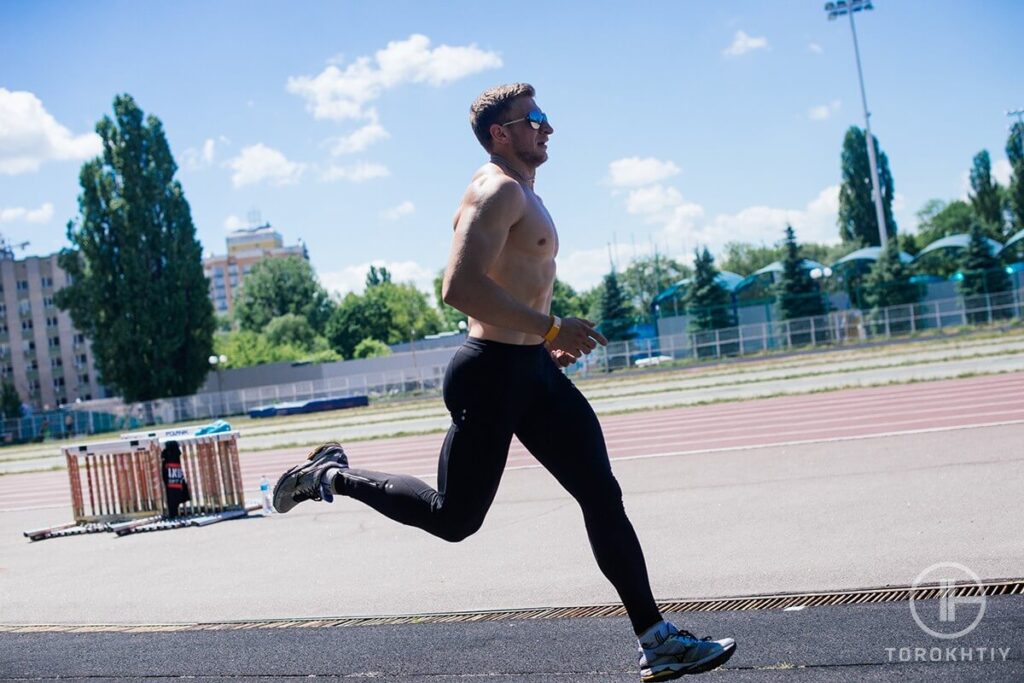
Running Time Calculator: Calculate Your 10k Time By Age and Gender
Calculate your finish 10K time with our calculator, this calculator can help you to determine the approximate time it takes to complete a 10K, considering factors such as your gender, level of training, and age. Calculate your time today and start strategizing for you victory in!
Running Time Calculator
Result:
What Is a Good 10k Time?
A good 10k time depends primarily on factors such as individual fitness levels, training plan, speedwork, and experience. Generally speaking, a good 10k race finish time is around 54-58 minutes for male beginners and 01:00-01:02 for women. Advanced runners typically take 45 minutes or less to complete a 10K race.
Here are the factors influencing your 10k time:
1. Speed
Increasing speed is essential for achieving a good 10K time. Faster running times can be achieved by dedicating more time to training and pushing yourself further with each workout.
This includes gradually increasing weekly mileage, as well as incorporating interval training, hill sprints, and threshold pace runs into your routine.
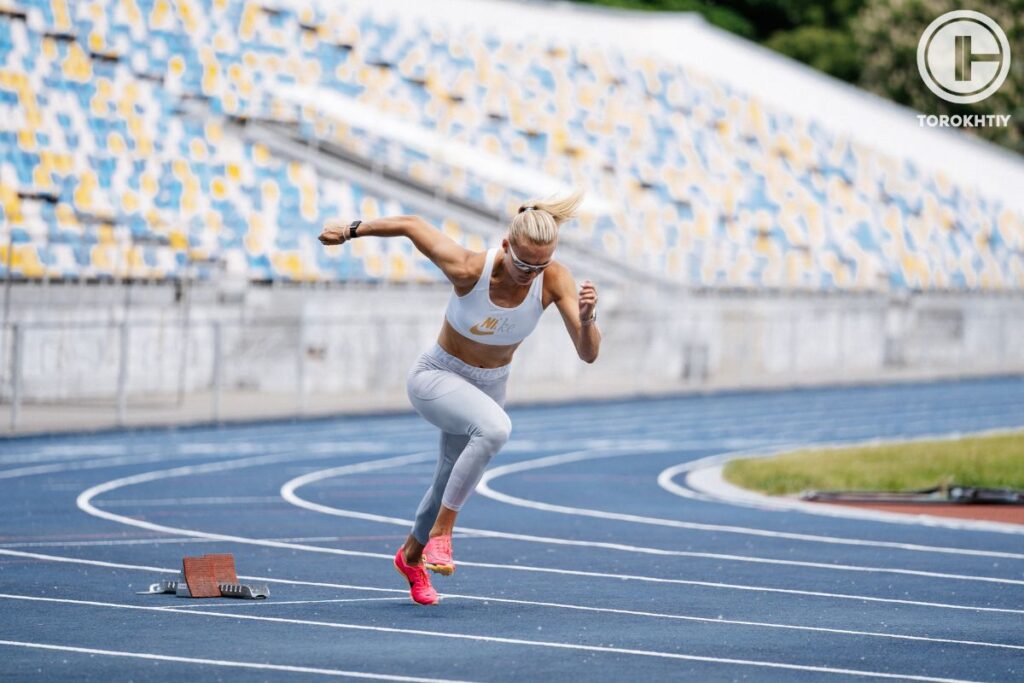
2. Fitness Level
Fitness level is a crucial factor when aiming for a good 10K time. The less physically fit you are, the heavier your legs feel and the harder it will be to get the result you want.
High levels of aerobic conditioning allow runners to maintain their speed for longer periods throughout a race. Overall physical fitness also helps to prevent injuries during training runs or during races. Weaker ligaments and lower muscle mass can lead to poor form, increasing injury risk.
3. Training and Preparation
A successful 10K race begins with the right training and preparation. Increasing your weekly mileage, even by as little as 5-10%, can have a big impact on improving your overall running time.
Training at threshold pace is also an important strategy for improving your 10K time. Incorporating exercises that will increase speed, like interval workouts or hill repeats, into your routine is highly beneficial for fast 10K runs.
4. Age and Gender
Generally speaking, younger runners tend to have faster run times than those who are older, due to overall physical fitness and athletic ability. Male runners also tend to be faster than female runners, due to differences in physiology.
5. Course Terrain and Conditions
Hills, surface type, and weather all have an impact on how well you perform. Hills especially can slow down a runner’s pace, while downhills can provide an unexpected burst of speed.
With different types of surfaces and changing weather conditions affecting races, runners must adjust their strategies accordingly for greater success.
6-Week Training Plan for 10k
A progressive running program is essential for effective training. It includes both general and specific work, as well as rest days.
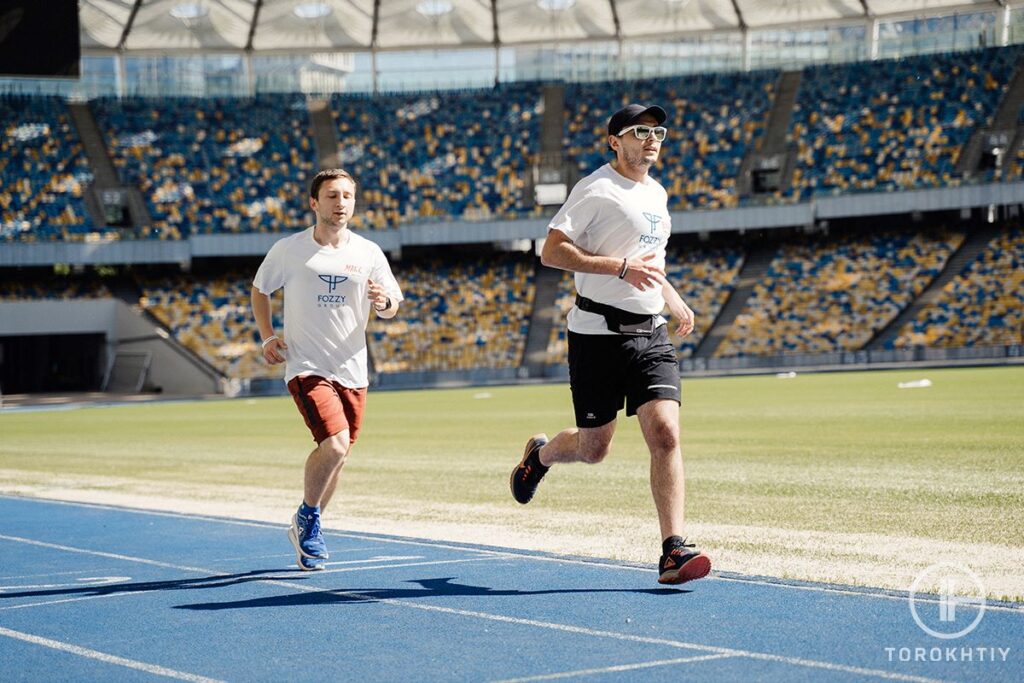
Week 1
The novice 10k program begins with relatively low weekly mileage, as well as cross-training activities. This allows the runner’s body to adapt and ensures that they will feel comfortable with going further in coming weeks.
| Monday | Tuesday | Wednesday | Thursday | Friday | Saturday | Sunday |
|---|---|---|---|---|---|---|
| 3k easy pace | Cross training | Rest day | 3.5k easy pace | 40 min recovery jog | 3 miles long run | Rest day |
Week 2
Week 2 of the 6-week 10k training plan is focused on gradually increasing your weekly mileage and beginning to incorporate threshold pace training. You should aim for a 10-20% increase in your mileage each week. For example, if you jogged 7 miles last week, try running 8 miles this week.
Threshold pace running (also called tempo running) involves running at 80% of your maximum effort. It helps build cardiovascular endurance, which will come in handy on race day.
| Monday | Tuesday | Wednesday | Thursday | Friday | Saturday | Sunday |
|---|---|---|---|---|---|---|
| 3k tempo run | Cross training | Rest day | 4k easy pace | 50 min recovery jog | 4 miles long run | Rest day |
Week 3
During the third week, runners have the opportunity to optimize their running training and race tactics to improve their 10K times. Add interval training to boost your speed and increase your total weekly mileage.
This week also encourages strength work, such as core exercises and stair climb circuits, which help build a strong foundation and prevent injuries.
| Monday | Tuesday | Wednesday | Thursday | Friday | Saturday | Sunday |
|---|---|---|---|---|---|---|
| 4×400 m interval run with 7 min jog in between | Strength training | Rest day | 4k tempo run | 50 min recovery jog | 5 miles long run | Rest day |
Week 4
When it comes to the 4th week of a 10k training plan, runners should actively increase their intensity. Focus on higher rep runs and shorter interval efforts during this phase to gain optimal conditioning for a 10K race.
| Monday | Tuesday | Wednesday | Thursday | Friday | Saturday | Sunday |
|---|---|---|---|---|---|---|
| 5k tempo run | Strength training | Rest day | 8×100 m interval run with 3 min jog in between | 50 min recovery jog | 6 miles long run | Rest day |
Week 5
This training week helps build speed and endurance and improves overall fitness. Add hill training and continue working on speed with tempo runs and intervals.
| Monday | Tuesday | Wednesday | Thursday | Friday | Saturday | Sunday |
|---|---|---|---|---|---|---|
| 6k tempo run | 1h recovery jog | Rest day | Hill intervals | Cross-training | 7 miles long run | Strength training |
Week 6
Week 6 of our 10K training plan includes several types of speed workouts, threshold runs, recovery runs, and cross-training activities.
| Monday | Tuesday | Wednesday | Thursday | Friday | Saturday | Sunday |
|---|---|---|---|---|---|---|
| 7k tempo run | 1h recovery jog | Rest day | 6×400 m interval run with 5 min jog in between | Cross-training | 8 miles long run | Strength training |
How to Improve Your 10K Time?
Improving your 10K time can seem daunting, but with the right training plan and preparation, you can reach your goals. To achieve a good 10K time, consider factors such as speed, fitness level, terrain, and weather conditions.
Start by evaluating what pace is comfortable for you during easy runs or long-distance races. Also focus on strength training and endurance by tracking changes in heart rate activity during runs. This ensures consistency in benchmark performances leading up to race day.
Here are 7 more tips to help you cover the 10k distance faster:
1. Develop a Strong Base
Build a solid foundation to get the most out of your 10K running performance. Gradually increasing both your long run distance and weekly mileage can lead to improved results when racing a 10K.
Tips From the Champ
Improving endurance is possible with regular training, which involves incorporating consistent runs with varied workouts such as intervals, hill works, tempo runs, and so on.
Running Coach Nike Run Club Kyiv
2. Follow a Training Plan or Work with a Coach
Having a structured plan helps you stay organized, set achievable goals, and track your progress over time.
A well-designed program allows you to focus on specific skills each week that will ultimately boost speed and overall performance. Additionally, working with an experienced coach can provide personalized guidance tailored specifically to your individual goals to maximize results.
3. Incorporate Long Runs and Varied Workouts
Long runs are an integral part of any training plan for a 10K race. They should gradually increase in distance to help build endurance before your race. This will also ensure your body is better prepared for the physical demands of running a 10K.
A variety of additional workouts is important for improving speed and performance on race day.
Try mile repeats, tempo runs at threshold pace, sprints using intervals or ladders, hill sprints, and fartleks (interval-style training where you run fast over varying distances).
4. Prioritize Rest and Recovery
Without proper rest and recovery, athletes risk injury due to too much strain being placed on their bodies and not enough time to repair and heal between sessions.
Rest days allow the body to adapt and recover from the physical stress that comes with rigorous training, while also reducing fatigue so you can maximize performance on race day.
5. Include Strength Training 1-2 Times per Week
Strength training is a key component of any runner’s routine. Though running makes up the majority of your weekly training, strengthening muscles can also help you enhance your performance in a 10K race.
Strength training not only builds muscle and focuses on specific goals, but can also improve stability and balance. It translates to improved form while running for extended periods over long distances.
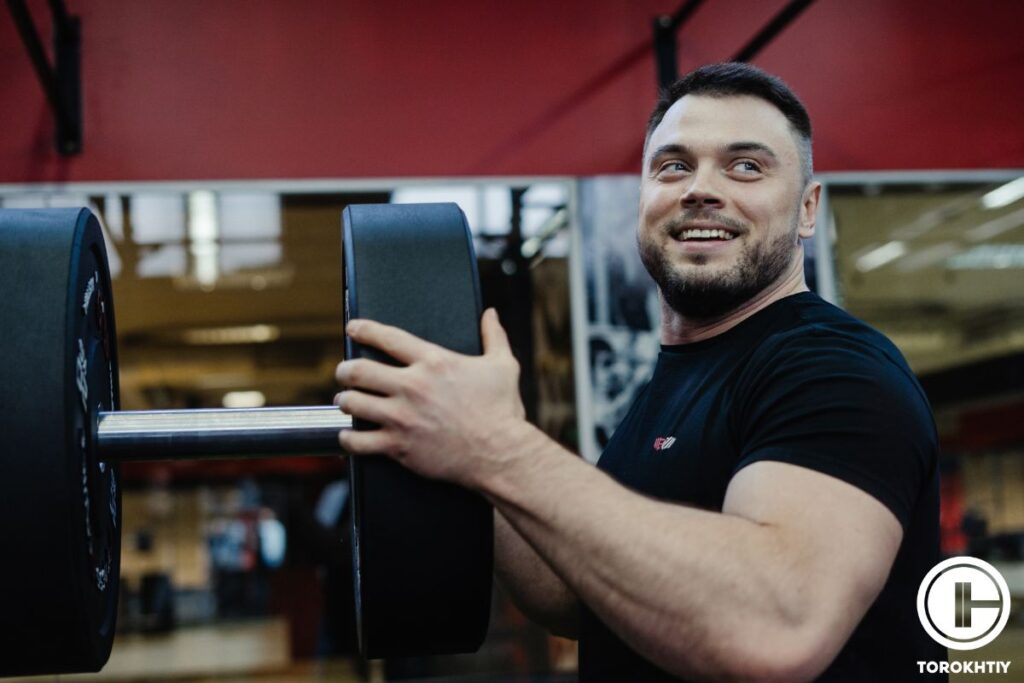
6. Focus on Mobility, Stability, Flexibility, and Balance Work
Mobility exercises help muscles move more freely throughout a run, while flexibility helps with the range of motion needed for an efficient stride. Both are essential for better running performance, which can lead to faster times over the course of a race.
Stability helps provide core support and maintain balance during longer runs. Balance drills such as single-leg hops and lateral jumps help to increase overall coordination, helping runners when fatigue sets in during races or workouts.
7. Set Goals and Track Progress
Setting goals and tracking progress can help you achieve success in any sport, especially running. It provides motivation to keep working and training, even when you might not feel like it
A good idea is to set a timeline for when these targets should be achieved, providing clear milestones that need to be accomplished.
The Best 10K Time
The 10K is a popular running event and an achievable goal for many runners. The current men’s world record for the 10K was set on October 7th, 2020, by Joshua Cheptegei, who hails from Uganda. His blistering time of 26 minutes and 11 seconds shattered the previous record held by Kenyan long-distance runner Leonard Komon, which stood at 26 minutes and 44 seconds since 2010!
The female world record belongs to Ethiopian runner Letesenbet Gidey, who ran 10k in 29 minutes and 1 second in June 2021.
Hoka Bondi 8
- Material: Breathable and supportive mesh upper
- Sole Material: Full-length EVA midsole for maximum cushioning
- Outsole (tread feature): Durable rubber outsole with a unique lug pattern
- Drop: 4mm
- Season: Suitable for all seasons
- Special Features: Exceptional cushioning and comfort
- Size: Available in various sizes
- Type: Maximum cushioning running shoe
If you want excellent running or walking shoes or just footwear you’ll be comfortable in, you can’t go wrong with the Hoka Bondi 8.
It’s been upgraded and now they have lighter, softer materials and a new extended heel design. The heel design gives a super soft, balanced feeling from th emoment your heel hits the ground to when you push off with your toes.
As far as the weight goes, it’s around 10.80 ounces, and the heel drop is 4 mm. They’re not too heavy and the lower drop is a good balance between cushioning and feeling connected to the ground.
The Bondi 8 is focused on cushioning and keeps things simple. There’s a good amount of support without any extra stuff that you don’t really need and that would only jack up the price. Take the rear crash pad, for example – it makes for a soft, smooth ride, which is perfect if you like to run outdoors.
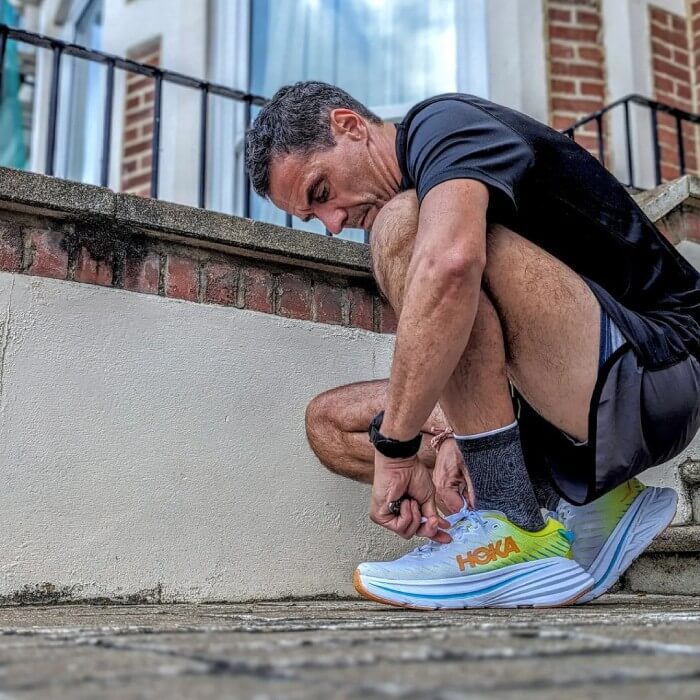
The upper part is made of engineered mesh, which is breathable and keeps your feet cool and dry. The tongue and collar have memory foam and mold to your foot shape. All of these features make the fit snug but flexible, which is exactly what you would want.
The Bondi 8 is eco-friendly because it uses recyclable materials in parts like the mesh and the sockliner. Plus, the shoes are completely vegan, which (if that’s important to you) is nice!
Frequently Asked Questions About the Best 10k Time
How Do I Control My Pace During a 10k?
Use tools such as a GPS watch or app, where you can monitor your average pace for 10k and distance covered. This can help ensure that you’re not running too fast or slow during any one part of your run.
Is 45 Minutes Fast for 10km?
A 45-minute 10km is considered an intermediate time for male runners and a fast time for female runners. A fast time for men is about 38-42 minutes.
How Fast to Run 10k in 55 Minutes?
Running a 10K in 55 minutes requires a pace of 8:51 per mile. This translates to 5:30 per kilometer, for those who prefer the metric system.
Final Thoughts on the Best 10k Time
A good 10k time is a combination of many factors, such as speed and fitness level, training and preparation, age and gender, course terrain, and weather conditions. Achieving your personal best 10k time means staying disciplined in the weeks leading up to your race, with consistent training that includes speed workouts and endurance training.
Strength training can also be beneficial for increasing running efficiency, while gradually increasing overall mileage gets you ready for the longer distance.
Find what works for you through trial and error, bearing in mind that the best way to gain success is with hard work and dedication. With just 6 weeks of preparation, there’s no reason you can’t reach your goal on race day.
What is your 10k time? Please share your results in the comments below.
References:
- Running Level. What is a good 10k run time? https://runninglevel.com/running-times/10k-times
- Kreher JB, et al. Overtraining syndrome: a practical guide. Sports Health. 2012;4(2):128-138 https://www.ncbi.nlm.nih.gov/pmc/articles/PMC3435910/
- Joshua Cheptegei https://en.wikipedia.org/wiki/Joshua_Cheptegei
- Letesenbet Gidey https://en.wikipedia.org/wiki/Letesenbet_Gidey
- Lehto N. Effects of age on marathon finishing time among male amateur runners in Stockholm Marathon 1979-2014. J Sport Health Sci. 2016 Sep;5(3):349-354 https://www.sciencedirect.com/science/article/pii/S2095254615000435
- Photos by Torokhtiy Media Team.
Why Trust Us?
With over 20 years in Olympic weightlifting, strength training, nutrition coaching, and general fitness our team does its best to provide the audience with ultimate support and meet the needs and requirements of advanced athletes and professional lifters, as well as people who strive to open new opportunities and develop their physical capabilities with us.
By trusting the recommendations of our certified experts in coaching, nutrition, and sports training programming, as well as scientific consultants, and physiotherapists, we provide you with thorough, well-considered, and scientifically proven content. All the information given in the articles concerning workout programming, separate exercises, and athletic performance, in general, is based on verified data.
The product testing process is described in more detail here.
Oleksandr is a running coach and member of the Nike Run Club coaching team for 8 years. A participant in national and international competitions at distances from one kilometer to the ultra trail. Owner of mountain trail running camps. Nowadays Oleksandr is responsible for creating running training programs for athletes of various levels, coaching personally offline and online, conducts trail running camps in the mountains, participates in competitions.




Still have questions after reading our article? Unlock your full potential by engaging with our experts and community! Don’t hesitate — leave a comment below and Oleksandr Zagrebelnyi will provide a personalized answer and insights to help you reach your goals.